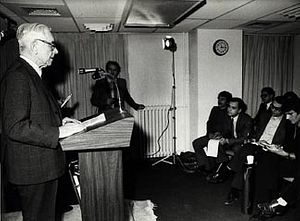In the immediate aftermath of the Second World War, Robert Strausz-Hupe, then a professor at the University of Pennsylvania, wrote a book entitled The Balance of Tomorrow, in which he envisioned not just the postwar struggle between the Soviet Union and the United States, but also the geopolitical rise of the Asian powers of China and India.
Strausz-Hupe was born in Vienna in 1903, in the decaying Austro-Hungarian Empire. In 1923, he emigrated to the United States and worked as an investment advisor to several American financial institutions. In the late 1930s, he began lecturing audiences on the coming war, and as a result of one such lecture in Philadelphia he was invited to teach at the University of Pennsylvania.
During the Second World War, Strausz-Hupe wrote a timely and informative book, Geopolitics: The Struggle for Space and Power, which analyzed the writings of Karl Haushofer and others associated with the German school of Geopolitik and their influence on German foreign policy.
Shortly after the war, he wrote The Balance of Tomorrow in an effort to educate U.S. policymakers and the American people about the realities of world politics.
Strausz-Hupe’s worldview was shaped in part, by the geopolitical ideas and concepts of the great British geographer Halford Mackinder, whose “The Geographical Pivot of History” in 1904 and Democratic Ideals and Reality in 1919, explained great power politics as the struggle between land powers based on the Eurasian continent and insular sea powers offshore. Mackinder identified the inner core area of Eurasia as the Heartland, the peninsular regions of Europe, the Middle East, and the Far East as the Coastlands, and Great Britain, Japan, the Americas and Australia as the insular or outer crescent of sea powers. Mackinder viewed the dual continent of Eurasia-Africa as the World-Island and issued his famous dictum: “Who rules the Heartland commands the World-Island; Who rules the World-Island commands the world.”
In The Balance of Tomorrow, Strauzs-Hupe wrote that “Mackinder’s concept of the ‘heartland’ is today, no less than it was first presented in 1904, the fundamental axiom of world politics.” The immediate concern for the United States was a victorious Soviet Union in control of the Heartland and threatening the Coastlands of Europe, the Middle East, and Asia. He cautioned, however, that “political power is never at rest; it grows and diminishes; it is always in movement.” Therefore, he explained, today’s power relationships and power distribution would not remain static. “Power political relations,” he wrote, cannot be frozen into immobility.”
The factors of power that determined the balance of power at any given time, he noted, included population size and demographic trends, geographical position, economic strength, natural resources, industrial development, and political, economic and military organization which “transforms these elements of power into world-political realities.”
In 1945, he noted, the Western powers held significant advantages in all of these elements, except demographics. Western industrial development, technology, and organization had thus far enabled Western powers to more than offset the manpower advantages of Asia. But, warned Strausz-Hupe, “the comfortable margin of Western technological superiority [was] wearing thin.” “The introduction of Western techniques [to Asia] will,” he wrote, “within two or three decades make Asiatic manpower effective . . . and [that] will weigh heavily in the scales of world power.
In a Mackinderesque geopolitical warning, Strausz-Hupe wrote, “If the control of Siberia and central Asia is joined to the control of north China, Manchuria, and Korea, then the monsoon countries will be bracketed by the power which . . . controls the ‘pivot of world history’ and the ‘world-island’ will be dominated by a single master, the final step to mastery of the globe.”
China and India, he predicted, will eventually develop economic and industrial growth, similar to what happened in Japan, and that coupled with greater political organization in both countries will alter the future global balance of power. All other things being equal, he noted, “power contests are a crude business in which accounts are settled in numbers of men.”
Strausz-Hupe went on to write more books, including The Protracted Conflict; founded (in 1955) and led the Foreign Policy Research Institute (FPRI) and started-up its respected journal of world affairs, Orbis; and served as a U.S. diplomat in Ceylon (Sri Lanka), Belgium, Sweden, the NATO Council, and Turkey. One of his colleagues at FPRI, the late Harvey Sicherman, recalled Strausz-Hupe’s definition of a statesman’s duty: “His is the task to persuade the people to silence their immediate needs with a view of the future. The history of democratic foreign policy is the history of men who succeeded or failed at this task.” In The Balance of Tomorrow, Strausz-Hupe succeeded in analyzing fundamental global power trends and viewing the future – a future where the balance of power would tilt towards Asia.
Francis P. Sempa is the author of Geopolitics: From the Cold War to the 21st Century (Transaction Books) and America’s Global Role: Essays and Reviews on National Security, Geopolitics and War (University Press of America). He is also a contributor to Population Decline and the Remaking of Great Power Politics (Potomac Books). He has written on historical and foreign policy topics for Joint Force Quarterly, American Diplomacy, the University Bookman, The Claremont Review of Books, The Diplomat, Strategic Review, the Washington Times and other publications. He is an attorney, an adjunct professor of political science at Wilkes University, and a contributing editor to American Diplomacy.

































